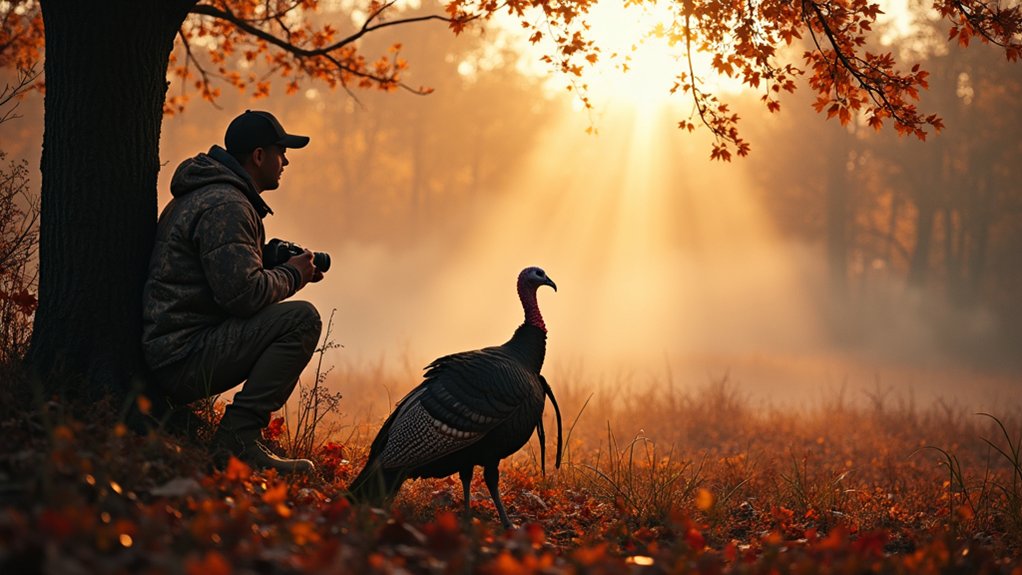If you’re considering turkey hunting, you’re in for an engaging experience that combines skill with an appreciation for nature. It’s important to understand the basics to guarantee a rewarding outing. From selecting the right gear to mastering calling techniques, each step is essential. But before you head out, there are some key strategies and insights you need to know. Let’s explore what it takes to get started on this exciting journey.
What is Turkey Hunting and Why is it Popular?
Turkey hunting is a thrilling outdoor activity that combines skill, strategy, and a deep appreciation for nature. You get to immerse yourself in the wilderness, experiencing the sights and sounds of the great outdoors.
It’s popular because it offers a unique blend of challenge and excitement, whether you’re a seasoned hunter or a novice. The thrill of calling in a turkey, waiting patiently, and then making that perfect shot creates an adrenaline rush that’s hard to match.
Plus, it fosters camaraderie among friends and family, turning each hunt into a memorable adventure, while also promoting conservation and wildlife management.
How to Choose the Right Turkey Hunting Gear
When you’re gearing up for turkey hunting, choosing the right equipment can make all the difference in your success and enjoyment.
Start with a quality shotgun, ideally 12 or 20 gauge, and select the appropriate ammunition for turkey hunting.
Don’t forget a reliable turkey call; both box and diaphragm calls have their advantages.
Wear camouflage clothing that blends with the terrain, and invest in a good pair of binoculars for spotting.
Finally, consider protective gear like a turkey vest and a comfortable seat.
With the right gear, you’ll improve your chances and have a more enjoyable experience in the field.
What Are the Best Turkey Hunting Techniques for Beginners?
Although it might seem intimidating at first, mastering the best turkey hunting techniques can greatly increase your chances of success.
Start by learning to use a call; both box and mouth calls can attract turkeys effectively. Practice your calling to sound realistic.
Next, employ good camouflage and remain still, as turkeys have sharp eyesight. Focus on early morning or late afternoon hunts when turkeys are most active.
Finally, be patient. Sit quietly and observe your surroundings. Remember to stay aware of your surroundings and always prioritize safety.
How to Scout for Turkey Hunting Locations
Successful turkey hunting isn’t just about mastering calling techniques; it also involves knowing where to find your target.
Begin by scouting areas with ample food sources, like fields and orchards. Pay attention to water sources too, as turkeys need hydration. Look for signs like droppings, feather trails, and scratch marks in the dirt.
Early mornings and late afternoons are ideal for spotting turkeys as they feed. Utilize maps or apps to mark potential hotspots and be mindful of terrain, such as hills and valleys.
Finally, don’t forget to respect private property and obtain necessary permissions when scouting.
When is the Best Time to Go Turkey Hunting?
What time of year you choose to go turkey hunting can greatly impact your success.
Spring is the prime season, especially during mating season when gobblers are more vocal and active. Typically, this runs from March through May, depending on your location.
Early morning and late afternoon are the best times to hunt, as turkeys are more likely to be on the move.
Keep an eye on weather conditions, too; overcast days can increase turkey activity.
By planning your hunt during these ideal times, you’ll enhance your chances of making a successful harvest.
What Are the Rules and Regulations for Turkey Hunting?
Knowing the best times to hunt is just the beginning; understanding the rules and regulations for turkey hunting is just as important. Each state has specific laws regarding hunting seasons, bag limits, and required licenses. You’ll need to check your local regulations to verify compliance.
Some areas may also have designated zones, restrictions on hunting methods, or specific equipment requirements. Familiarize yourself with the legal hunting hours and any necessary permits.
Respecting these guidelines not only keeps you safe but also helps preserve turkey populations for future hunters. Always prioritize ethical hunting practices and wildlife conservation.
Happy hunting!
How to Prepare for Your First Turkey Hunting Trip
As you gear up for your first turkey hunting trip, it’s essential to make a solid plan to guarantee a rewarding experience.
Start by scouting locations where turkeys frequent. Familiarize yourself with their behaviors and patterns. Gather necessary gear, including a quality shotgun, appropriate ammunition, and comfortable clothing.
Don’t forget your calls and decoys; they can considerably increase your chances. Practice shooting to verify accuracy.
Finally, review safety rules and regulations for your area to stay compliant. With the right preparation, you’ll boost your confidence and enhance your chances of a successful hunt.
Enjoy the adventure ahead!
What Should You Do After a Successful Turkey Hunt?
Once you’ve successfully bagged your turkey, it’s time to focus on the next steps that guarantee you preserve your hard-earned prize.
Start by field dressing the bird to remove internal organs, which helps prevent spoilage. Next, cool the turkey quickly by hanging it in a shaded area or placing it in a cooler with ice. This maintains freshness for cooking or storage.
Don’t forget to tag your turkey properly, adhering to local regulations.
Finally, when you get home, store it in the fridge or freezer until you’re ready to prepare a delicious meal that showcases your hunting success. Enjoy!
